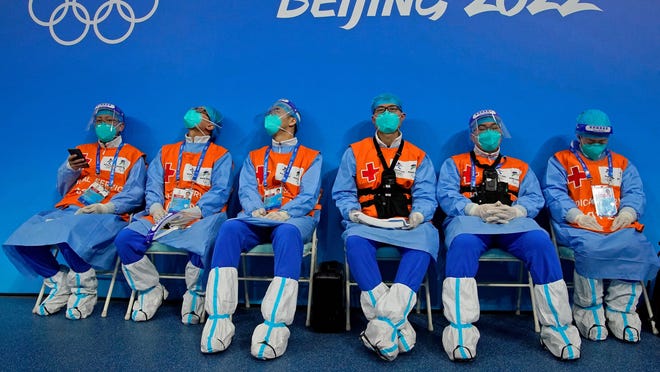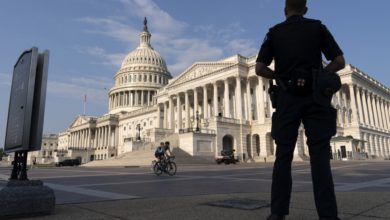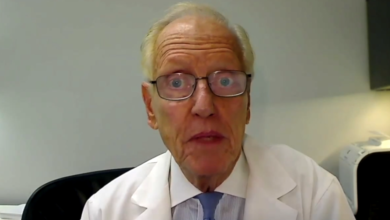
The pace of new coronavirus cases in the United States has fallen by more than two-thirds from its peak just weeks ago, Johns Hopkins University data shows.
Still, the nation is reporting 1.86 million cases a week, and about 2,500 COVID-19 deaths continue to be reported every day. But at least four states expect continued improvement, announcing this week they would be ending statewide mask mandates in schools within the next two months as indoor masking requirements continue to lift across the country.
Connecticut, Delaware, New Jersey and Oregon's governors all said Monday they would end mandatory masking in schools by the end of February or March, while Pennsylvania made the decision to remove its statewide mandate last month.
Illinois Gov. J.B. Pritzker, however, is waging a court battle to keep his mask mandate for schools alive. The state attorney general this week appealed a judge’s ruling that invalidated Pritzker’s mandate.
“Absent a stay, students, teachers, and other school employees will be further exposed to COVID-19, leading to additional and likely widespread transmission within schools and in the broader community, increased hospitalizations and deaths, and school staff shortages requiring full remote learning or even school closures,” the appeal stated.
Also in the news:
►The weeks-long protest in Canada over COVID-19 vaccine mandates spilled over into Detroit late Monday when authorities closed the Ambassador Bridge. The protesters blocked traffic on the massive international suspension bridge and prevented motorists from passing.
►Vaccination helps protect not only expectant mothers but also their babies, both in utero and after birth, according to two separate studies whose conclusions run counter to common misinformation about the vaccine and pregnancy.
📈 Today's numbers: The U.S. has recorded more than 76 million confirmed COVID-19 cases and more than 905,000 deaths, according to Johns Hopkins University data. Global totals: More than 397.8 million cases and over 5.7 million deaths. More than 212 million Americans – 64.1% – are fully vaccinated, according to the Centers for Disease Control and Prevention.
📘 What we're reading: 'He deserves to be up there with us.' After a positive COVID test, a U.S. skater misses out on celebrating silver.
Keep refreshing this page for the latest news. Want more? Sign up for USA TODAY's free Coronavirus Watch newsletter to receive updates directly to your inbox and join our Facebook group.
Caribbean open for business amid varying restrictions
Most Caribbean destinations have reopened to international travelers, but visitors will need to be aware of their destination's COVID-19 travel restrictions before boarding their flight. Entry requirements vary across each island; some require testing, some ask for masks to be worn in public, and others enforce a curfew on certain businesses. Travelers can expect the rules to be in flux as countries adjust to match the evolving pandemic. Entry requirements for some of the most popular Caribbean island destinations are explained here.
– Bailey Schulz
Small hospitals are left behind by COVID staffing wars
A recent lawsuit filed by one Wisconsin health system that temporarily prevented seven workers from starting new jobs at a different health network raised eyebrows, including those of Brock Slabach, chief operations officer of the National Rural Health Association.
“To me, that signifies the desperation that hospital leaders are facing in trying to staff their hospitals,” said Slabach. His concern is for the smaller facilities that lack the resources to compete.
Already strained by the COVID-19 pandemic, hospitals around the country are desperate to staff their facilities as the highly transmissible omicron variant spreads. Governors in states such as Massachusetts and Wisconsin deployed the National Guard to help hospitals combat the surge. Six hospitals in Cleveland took out a full-page ad in the Sunday Plain Dealer with a singular plea to the community, “Help.” CoxHealth is among the medical systems in Missouri to ask its office staff to help out on the front lines.
Smaller facilities – particularly rural ones that have struggled for years to stay afloat –are finding it difficult, if not impossible, to compete for health care workers in this labor market. If a hospital is unable to maintain safe staffing levels, it could be forced to curtail services or possibly close, a devastating blow for both the patients and economies of those communities. Nineteen rural hospitals closed in 2020 alone.
– Bram Sable-Smith, Kaiser Health News
Contributing: Mike Stucka, USA TODAY; The Associated Press
Source link







